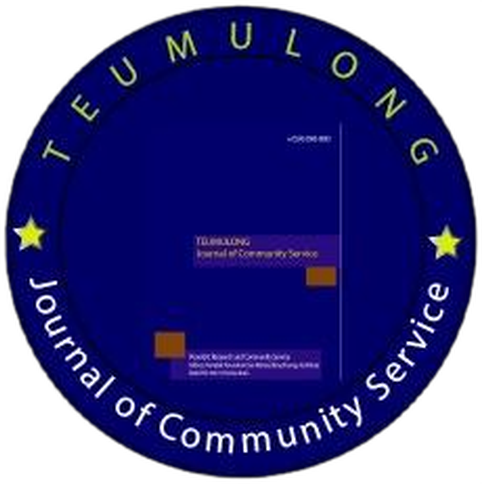Multi-Stakeholder Innovation Based Quadruple Helix Thinking : Teenage Promiscuity Prevention in Indonesia
DOI:
https://doi.org/10.62568/jocs.v1i2.18Keywords:
Multi-stakeholder, Innovation Based Quadruple Helix Thinking, Teenage PromiscuityAbstract
The rising rates of teenage pregnancy and sexually transmitted infections demand a collaborative solution involving multiple stakeholders. To prevent promiscuity among teenagers, the Quadruple Helix Thinking approach is employed. The objective of this investigation is to examine the cooperation among stakeholders, notably Polsek, Puskesmas, and the Indonesian Ulema Council (MUI), in curbing promiscuity among teenagers residing around Pasir Jambu Village. This study employs a descriptive qualitative methodology to elucidate the role and efficacy of stakeholder collaboration in mitigating promiscuity among adolescents. The primary sources of data collection comprise input gathered from informants while the secondary data include supporting documents and records. The data gathering techniques involve surveys and interviews. The participants selected for this study consisted of junior and senior high school students from Jambu Village who were at risk for promiscuity. Interviews were conducted with both MUI and parents, following the specified criteria. Descriptive analysis was utilized, and the interactive model was adapted to analyze the data. The findings demonstrate that inter-agency collaboration effectively prevented promiscuity in Pasir Jambu Village
References
Bonde, A., Kandowangko, N., & Zakarias, J. (2019). Peran Tokoh Agama dalam Penanggulangan Pergaulan Bebas bagi Remaja (Suatu Studi di Desa Doloduo Kecamatan Dumoga Barat). Jurnal Holistik, 12(1), 1–20.
Buchtova, M., Malinakova, K., Kosarkova, A., Husek, V., van Dijk, J. P., & Tavel, P. (2020). Religious attendance in a secular country protects adolescents from health-risk behavior only in combination with participation in church activities. International Journal of Environmental Research and Public Health, 17(24), 1–13. https://doi.org/10.3390/ijerph17249372
Dreweke, J. (2019). Promiscuity Propaganda: Access to Information and Services Does Not Lead to Increases in Sexual Activity. Guttmacher Policy Review, 22, 29–36.
Fauziyah, Tarigan, F. L., & Hakim, L. (2021). Analisis Faktor yang Mempengaruhi Perilaku Seks Kabupaten Aceh Utara Tahun 2021. Jurnal of Healthcare Techology and Mediccine, 7(2), 1526–1545.
Geller, A., & Fagan, J. (2019). Police contact and the legal socialization of urban teens. Rsf, 5(1), 26–49. https://doi.org/10.7758/RSF.2019.5.1.02
Hasche, N., Höglund, L., & Linton, G. (2020). Quadruple helix as a network of relationships : creating value within a Swedish regional innovation system. Journal of Small Business & Entrepreneurship, 32(6), 523–544. https://doi.org/10.1080/08276331.2019.1643134
Hickle, K., & Shuker, L. (2023). The ‘virtuous’ cycle of parental empowerment: Partnering with parents to safeguard young people from exploitation. Child and Family Social Work, 28(2), 527–536. https://doi.org/10.1111/cfs.12982
Iryadi, M. dan R. (2020). Pengaruh Empat Faktor Terhadap Pemberdayaan Remaja dalam Upaya Pencegahan Seks Bebas pada Program PKPR. Jurnal Ilmiah Indonesia, 2507(February), 1–9.
KEMENKO PMK. (2021). Pemerintah Fokus Cegah Perilaku Seksual Berisiko di Kalangan Pemuda.
Maryati, S., Muhibbinsyah, M., Hasanah, A., & Erihadiana, E. (2021). Sex Education on Islamic Religious Learning To Prevent and Correct Average Behavior In High Schools In Cirebon. Journal of Sosial Science, 2(4), 512–522. https://doi.org/10.46799/jss.v2i4.185
Mia, M., Maulana, M. F., Audia, A., & Zahrouddin, M. A. (2021). Peran Pendidikan Agama Islam (Pai) Dalam Mencegah Timbulnya Juvenile Deliquency. Aplikasia: Jurnal Aplikasi Ilmu-Ilmu Agama, 21(1), 81–88. https://doi.org/10.14421/aplikasia.v21i1.2110
Miles, M. B., & Huberman, A. M. (1994). Qualitative data analysis: An expanded sourcebook. sage. An Expanded Sourcebook. Sage.
Mundhiro, N., Fauzi, R., Maruf, M. A., & Jakarta, U. M. (2021). DETERMINANTS OF PREMARITAL SEXUAL BEHAVIOR AMONGST. 10(July), 86–93. https://doi.org/10.20473/jbk.v10i1.2021.86
Nadirah, S. (2017). Peranan Pendidikan Dalam Menghindari Pergaulan Bebas Anak Usia Remaja. Musawa: Journal for Gender Studies, 9(2), 309–351. https://doi.org/10.24239/msw.v9i2.254
Nurina. (2022). Involvement of Teachers and Religious Leaders Working to Anticipate Ethical Decadence of Youth. International Journal Education and Computer Studies (IJECS), 2(2), 44–53. https://doi.org/10.35870/ijecs.v2i2.788
Nusaibah Nur Furqani, Z. . (2020). The Role of Emotional Intelligence in Adolescent Development. 395(Acpch 2019), 277–280. https://doi.org/10.2991/assehr.k.200120.058
Onukwugha, F. I., Hayter, M., & Magadi, M. A. (2019). Views of service providers and adolescents on use of sexual and reproductive health services by adolescents: A systematic review. African Journal of Reproductive Health, 23(2), 134–147. https://doi.org/10.29063/ajrh2019/v23i2.13
Pandie, H. Y., Fallo, D. F. N., & Kian, D. A. (2023). KENAKALAN REMAJA SERTA HAMBATAN-HAMBATAN YANG DIALAMI. 4(5), 636–644.
Patilaiya, H. La. (2019). Health Education For Adolescents On The Prevention Of Sexually Transmitted Diseases ( STDs ). 384–387.
Ramaswamy, S., & Seshadri, S. (2019). Community-Based Interventions for Adolescent Psychosexual Health: The Use of Life Skills Training Approaches in Sexuality Education. Journal of Psychosexual Health, 1(3–4), 250–256. https://doi.org/10.1177/2631831819867581
RI, K. (2019). Pemuda Rumuskan Keterlibatan dalam Pembangunan.
Rulianti, D., & Mukminin, A. (2022). Early Childhood Education Papers Sexual Education in Early Children. 11(1), 9–15. https://doi.org/10.15294/belia.v11i1.57289
Setiabudi, F., Octamaya, A., Awaru, T., & Irwansyah, I. (2021). Upaya Remaja Dalam Pencegahan Pergaulan Bebas Di Sekolah Menengah Atas Negeri Kabupaten Sinjai. Pinisi Journal of Sociology Education Review, 1(1), 113–119.
Skrastins, E. (2023). Voices from the archive : The emergence of promiscuity as a mental disorder in Tasmania.
Stary, A. (2020). The changing spectrum of sexually transmitted infections in Europe. Acta Dermato-Venereologica, 100(100-year theme Cutaneous and genital infections), 242–247. https://doi.org/10.2340/00015555-3470
Sulem, E., Abend, O., & Rappoport, A. (2018). Semantic Structural Evaluation for Text Simplification. 685–696.
Suteja, J., Djumhur, A., & Djubaedi, D. (2021). Revitalisasi Pendidikan Seks dalam Upaya Pencegahan Kekerasan Seksual Anak. Prophetic: Professional, Empathy and Islamic Counseling Journal, 4(2), 115–136.
Vieira Martins, M., Karara, N., Dembiński, L., Jacot-Guillarmod, M., Mazur, A., Hadjipanayis, A., & Michaud, P. A. (2023). Adolescent pregnancy: An important issue for paediatricians and primary care providers—A position paper from the European academy of paediatrics. Frontiers in Pediatrics, 11(February), 1–6. https://doi.org/10.3389/fped.2023.1119500
Wilkins, N. J., Ph, D., Rasberry, C., Ph, D., Liddon, N., Ph, D., Szucs, L. E., Ph, D., Johns, M., Ph, D., Leonard, S., Goss, S. J., & Oglesby, H. (2022). Addressing HIV / Sexually Transmitted Diseases and Pregnancy Prevention Through Schools : An Approach for Strengthening Education , Health Services , and School Environments That Promote Adolescent Sexual Health and Well-Being. Journal of Adolescent Health, 70(4), 540–549. https://doi.org/10.1016/j.jadohealth.2021.05.017
Yafie, E. (2017). PENDIDIKAN SEKSUAL ANAK USIA DINI Jurnal CARE ( Children Advisory Research and Education). 4, 18–30.
Yafie, E., Iriyanto, T., Gonadi, L., & Wahyuni, S. (2018). Workshop pembuatan media education berbasis PPT anak usia dini untuk guru se-kota Malang dan alumni PGPAUD universitas negeri malang. Jurnal Karinov, 1(2), 1–8.
Yau, S., Wongsawat, P., & Songthap, A. (2020). Knowledge , Attitude and Perception of Risk and Preventive Behaviors toward Premarital Sexual Practice among In-School Adolescents. 497–510.
Yendi, F. M. (2020). Prevention of adolescent sexual behavior : Can be with family counseling ? 4, 44–47.
Yun, J. H. J., & Liu, Z. (2019). Micro- and macro-dynamics of open innovation with a Quadruple-Helix model. Sustainability (Switzerland), 11(12), 1–17. https://doi.org/10.3390/SU11123301
Downloads
Submitted
Accepted
Published
How to Cite
Issue
Section
License
Copyright (c) 2024 Siti Saodah Susanti, Azizuddin Mustopa

This work is licensed under a Creative Commons Attribution-ShareAlike 4.0 International License.





















